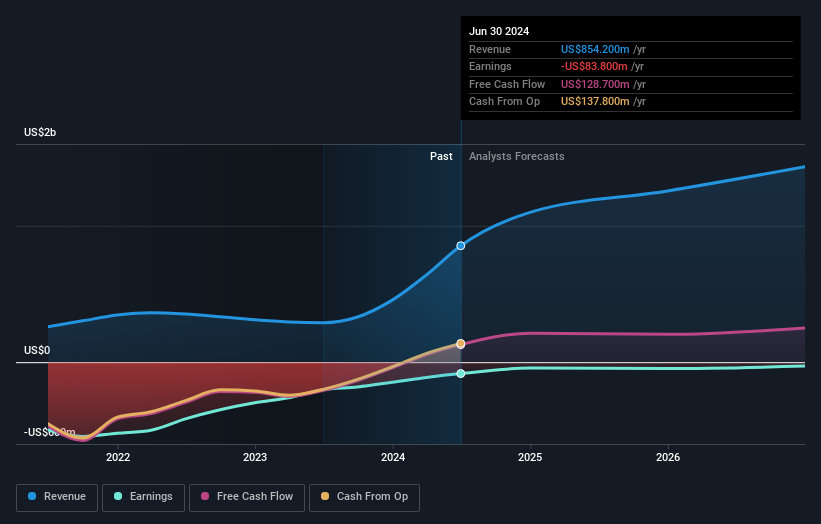- United States
- /
- Insurance
- /
- NasdaqGS:ROOT
Institutional investors are Root, Inc.'s (NASDAQ:ROOT) biggest bettors and were rewarded after last week's US$82m market cap gain

Key Insights
- Significantly high institutional ownership implies Root's stock price is sensitive to their trading actions
- A total of 8 investors have a majority stake in the company with 50% ownership
- Insider ownership in Root is 21%
Every investor in Root, Inc. (NASDAQ:ROOT) should be aware of the most powerful shareholder groups. And the group that holds the biggest piece of the pie are institutions with 39% ownership. In other words, the group stands to gain the most (or lose the most) from their investment into the company.
And things are looking up for institutional investors after the company gained US$82m in market cap last week. One-year return to shareholders is currently 343% and last week’s gain was the icing on the cake.
Let's take a closer look to see what the different types of shareholders can tell us about Root.
Check out our latest analysis for Root

What Does The Institutional Ownership Tell Us About Root?
Institutional investors commonly compare their own returns to the returns of a commonly followed index. So they generally do consider buying larger companies that are included in the relevant benchmark index.
As you can see, institutional investors have a fair amount of stake in Root. This implies the analysts working for those institutions have looked at the stock and they like it. But just like anyone else, they could be wrong. It is not uncommon to see a big share price drop if two large institutional investors try to sell out of a stock at the same time. So it is worth checking the past earnings trajectory of Root, (below). Of course, keep in mind that there are other factors to consider, too.

Root is not owned by hedge funds. Looking at our data, we can see that the largest shareholder is Ribbit Management Company, LLC with 13% of shares outstanding. Meanwhile, the second and third largest shareholders, hold 9.6% and 7.5%, of the shares outstanding, respectively. Alexander Timm, who is the third-largest shareholder, also happens to hold the title of Chairman of the Board.
We also observed that the top 8 shareholders account for more than half of the share register, with a few smaller shareholders to balance the interests of the larger ones to a certain extent.
Researching institutional ownership is a good way to gauge and filter a stock's expected performance. The same can be achieved by studying analyst sentiments. Quite a few analysts cover the stock, so you could look into forecast growth quite easily.
Insider Ownership Of Root
The definition of an insider can differ slightly between different countries, but members of the board of directors always count. Management ultimately answers to the board. However, it is not uncommon for managers to be executive board members, especially if they are a founder or the CEO.
Insider ownership is positive when it signals leadership are thinking like the true owners of the company. However, high insider ownership can also give immense power to a small group within the company. This can be negative in some circumstances.
It seems insiders own a significant proportion of Root, Inc.. Insiders have a US$119m stake in this US$573m business. It is great to see insiders so invested in the business. It might be worth checking if those insiders have been buying recently.
General Public Ownership
With a 23% ownership, the general public, mostly comprising of individual investors, have some degree of sway over Root. This size of ownership, while considerable, may not be enough to change company policy if the decision is not in sync with other large shareholders.
Private Equity Ownership
With a stake of 18%, private equity firms could influence the Root board. Some investors might be encouraged by this, since private equity are sometimes able to encourage strategies that help the market see the value in the company. Alternatively, those holders might be exiting the investment after taking it public.
Next Steps:
It's always worth thinking about the different groups who own shares in a company. But to understand Root better, we need to consider many other factors. Be aware that Root is showing 3 warning signs in our investment analysis , you should know about...
But ultimately it is the future, not the past, that will determine how well the owners of this business will do. Therefore we think it advisable to take a look at this free report showing whether analysts are predicting a brighter future.
NB: Figures in this article are calculated using data from the last twelve months, which refer to the 12-month period ending on the last date of the month the financial statement is dated. This may not be consistent with full year annual report figures.
New: AI Stock Screener & Alerts
Our new AI Stock Screener scans the market every day to uncover opportunities.
• Dividend Powerhouses (3%+ Yield)
• Undervalued Small Caps with Insider Buying
• High growth Tech and AI Companies
Or build your own from over 50 metrics.
Have feedback on this article? Concerned about the content? Get in touch with us directly. Alternatively, email editorial-team (at) simplywallst.com.
This article by Simply Wall St is general in nature. We provide commentary based on historical data and analyst forecasts only using an unbiased methodology and our articles are not intended to be financial advice. It does not constitute a recommendation to buy or sell any stock, and does not take account of your objectives, or your financial situation. We aim to bring you long-term focused analysis driven by fundamental data. Note that our analysis may not factor in the latest price-sensitive company announcements or qualitative material. Simply Wall St has no position in any stocks mentioned.
About NasdaqGS:ROOT
Excellent balance sheet and fair value.

